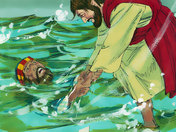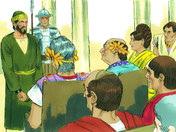Carla is not adjusting well to this time. It is an end of an era for her. Carla is a high functioning person with intellectual disabilities. Both parents have died. She became too ill to live in her own apartment any longer. For health and safety reasons, Carla has been moved into a group home where she can receive medical attention and help with personal care.
Joseph is experiencing the opposite. It is also an end of an era for him. His mother’s health has forced his family to make a hard decision. He, too, has been moved into a group home. While living at home, Joseph was never allowed to dress, shave or clean himself. He was told where to go and what to do. At the group home, he is required to clean, dress and shave himself. He must take part in the chores and activities of the household. He is required to do his own laundry and clean his own room.
Carla’s personality is softly pleasant. Her manners are tender and appealing. Joseph’s manner is gruff and abrasive. He never walks. He struts, giving the impression that he thinks more highly of himself than he ought.
 While Carla finds group home living restrictive and oppressive, Joseph has never had more freedom. Carla has fewer chores and responsibilities now that she no longer lives in her own apartment. Someone cooks her meals, helps her with her household chores when necessary. Without even informing her, the staff completes the paperwork required by the government which she often hid rather than traverse through the unintelligible maze of questions. Carla resents the assistance she receives.
While Carla finds group home living restrictive and oppressive, Joseph has never had more freedom. Carla has fewer chores and responsibilities now that she no longer lives in her own apartment. Someone cooks her meals, helps her with her household chores when necessary. Without even informing her, the staff completes the paperwork required by the government which she often hid rather than traverse through the unintelligible maze of questions. Carla resents the assistance she receives.
The demands on Joseph have multiplied but his finds increasing freedom in this new arrangement even though it is wrapped tightly with chores and requirements. Of course, Joseph has never been one to complain. He takes life as it come; and he trusts the Lord to work things out for his benefit. Joseph often prays out loud, seriously or happily asking God to help him.
Carla admits that she almost never prays. The requirements of “religion” are much too difficult and confining. Carla cannot grasp the concept of God being a friend–her friend.
Joseph’s cognitive level is far below Carla’s but his faith quotient soars far above most other people. He prays and expects an answer “because God loves me.” He believes that “all things work” for his good because “God said it in the Bible. Therefore, it’s true.”
In short, Carla is miserable and has been for years. Joseph is joyous. Each day is a welcomed adventure.
 Each of us come to times in our lives when things radically change. We graduate from college. We get married. Our first baby is born. The first child enters kindergarten. Then poof. In a few short days, she is entering college. The children leave home. The children come back home. A spouse dies.
Each of us come to times in our lives when things radically change. We graduate from college. We get married. Our first baby is born. The first child enters kindergarten. Then poof. In a few short days, she is entering college. The children leave home. The children come back home. A spouse dies.
Our IQ does not determine the position of our misery barometer. Through prayer and fellowship with our Heavenly Father and Savior, Redeemer, Friend Jesus our barometers are adjusting. They determine the joy and love into which we motivate through life. I am praying that my life will follow the example set by Joseph. Even though, he is a young man with a lousy personality and low IQ. Joseph has tapped into the life-giving force of the Lord Jesus. His example gives my hope and joy.












